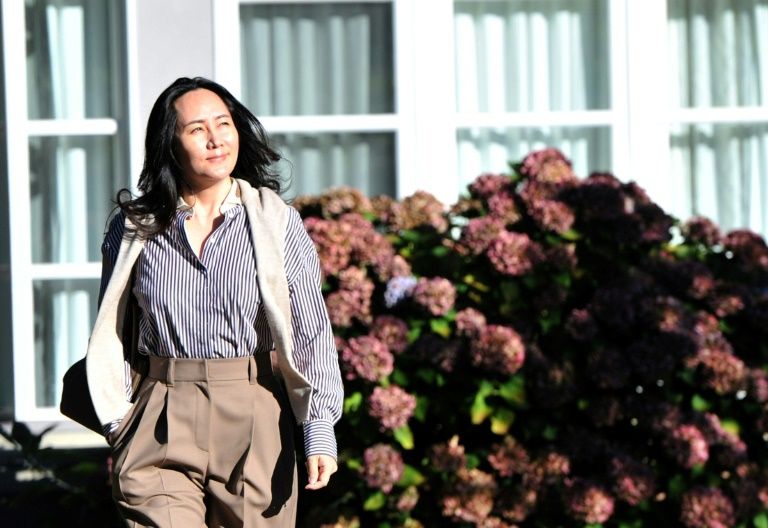Huawei exec accuses US of misleading Canada in extradition case
Vancouver (AFP) – Chinese Huawei executive Meng Wanzhou and her lawyers returned to a Canadian court on Monday to press for her release, arguing that the United States, by omitting key facts, blatantly misled Canada about her alleged crimes to secure her arrest.
The defense started the five-day hearing by saying that the crux of the US charges against Meng — that she hid Huawei’s relationship with former subsidiary Skycom in Iran from HSBC bank — is false and lacks context.
Meng’s lawyer Scott Fenton accused the United States of having “breached its duty to be forthright and candid.”
“The misstatements (and) omissions in the record of the case,” he told the British Columbia Supreme Court, “go to the very heart of the fraud case.”
As such, he said, the extradition proceedings should be halted.
The Chinese telecom giant’s chief financial officer was arrested on a US warrant in December 2018 during a stopover in Vancouver.
She is charged with bank fraud linked to violations of US sanctions against Iran, and has been fighting extradition ever since.
The case, meanwhile, has added to severe strain in Sino-US ties and created an unprecedented rift between Canada and China.
Nine days after Meng’s arrest, China detained former Canadian diplomat Michael Kovrig and businessman Michael Spavor in what is widely viewed as retaliation over Meng.
Espionage charges were filed against the pair in June, soon after Meng’s first legal setback, when her bid to have the case thrown out — arguing that the US accusations were not crimes in Canada — was defeated.
The past nearly two years of sporadic court appearances have so far seen Meng’s attorneys trade barbs with Canadian government lawyers over access to classified documents and purported violations of her rights.
– The Skycom connection –
Despite the Covid-19 outbreak’s disruptions of trials in Canada, Meng’s case has proceeded by teleconference — though at a slow pace.
She appeared in person on Monday for the first time in months, wearing a face mask, in accordance with public health rules.
US indictments allege that Meng and the world’s largest telecoms equipment manufacturer conducted business in Iran in violation of US sanctions through Skycom.
The US Justice Department says the Hong Kong-registered firm was a poorly disguised Huawei front company.
They note that Skycom employees had Huawei email addresses and badges, and that Skycom’s leadership were Huawei employees — including Meng, who has admitted to serving previously on its board.
Huawei also at one point owned a stake in Skycom but sold its shares to another company that the United States says also was controlled by Huawei.
The US alleges Meng fraudulently concealed all this from HSBC, putting the bank at risk of unknowingly violating Iran sanctions.
It pointed to a presentation Meng made in 2013 to an HSBC executive after the British banking group, worried over potential Iran exposure, requested an explanation.
But Meng insists she was up-front with HSBC and its executive at the Hong Kong tea house meeting.
“The vast majority of what (Meng) stated to HSBC is not included in the (case) summary,” Fenton said, adding that “key statements” she made to HSBC that could prove to be exculpatory were omitted.
The 48-year-old daughter of Huawei founder Ren Zhengfei, he said, “put HSBC on full notice that both Huawei and Skycom were doing business in Iran.”
“She told them everything they needed to know to measure sanctions risk,” he added, including how processing any related transactions through the US banking system could put HSBC in jeopardy.
Huawei has rejected as “unfounded” these and additional charges filed in February, accusing the company of stealing technologies from US firms.
Outside the Vancouver courthouse, Huawei spokesman Alykhan Velshi said Meng would be vindicated, while accusing the Trump administration of having “fed a steady stream of fake news about Meng Wanzhou to Canadian authorities and abused the Canadian legal system.”
US officials claim Huawei poses a security risk because of its links to China’s government, while Beijing has accused Washington of seeking to crush Huawei.
Meng remains under house arrest in Vancouver while the extradition case, which is due to wrap up in March or April 2021, is heard.
Disclaimer: Validity of the above story is for 7 Days from original date of publishing. Source: AFP.


